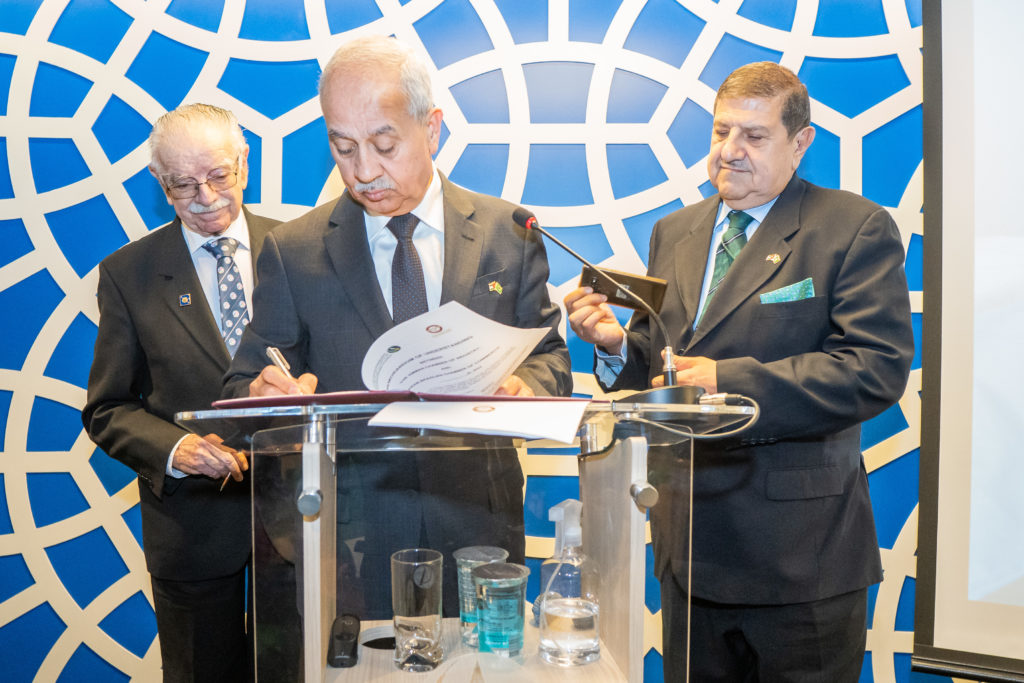São Paulo – Despite being a prominent food exporter, Brazil also imports foodstuffs and has opportunities for some goods supplied by Jordan. These niche markets were pointed out on Wednesday (18) during the seminar “Jordan & Brazil – Challenges and opportunities” that took place in the Arab Brazilian Chamber of Commerce (ABCC) and was attended by Jordanian and Brazilian businesspeople. A delegation from Jordan is in São Paulo for the food and beverage event APAS Show.

According to a presentation by ABCC Market Intelligence manager Marcus Vinícius, there are opportunities for Jordan to sell to Brazil olives, peaches, dates, spices, seeds, garlic, tomatoes, strawberries, and industrialized foods. As per data presented in the event, garlic is one of the few food items that the country sells to Brazil.
The ABCC’s executive also told the Jordanians about the opportunity in the Brazilian food market due to the decline in some tariff imports. Until the end of the year, the Brazilian government has cut to zero the tariff on some staple foods to contain slow down inflation. These products include frozen deboned beef, frozen chicken cuts and offal, wheat flour, baked goods, pastry and biscuit industry, and grain corn.
Giant Brazil

Brazil is the world’s seventh-largest food market, with USD 250 billion moved around a year, and it is estimated to reach USD 262 billion by 2025. A large part of the consumption is in e-commerce stores and large supermarkets. According to Marcus Vinícius, the consumption of organic foods and nutritional supplements is on the rise in the country, mainly due to COVID-19, as people want to reinforce the immune system.

The Arab countries, though, play a minor role in this market. Brazil imported USD 12 billion in foods worldwide, with only USD 118.6 million from the Arab countries. The largest Arab suppliers are Morocco at 37%, Egypt at 36%, Oman at 16%, Tunisia at 9%, and Lebanon at 1%. The products are mainly frozen sardines (half of the total), pickled vegetables, olive oil, plants, dates, nuts, anise seeds, oranges, dried vegetables, as well as onions and garlic.

Jordan is not among the leading Arab food suppliers to Brazil, despite exporting products from the sector to the world. Last year, Jordan sold USD 292,000 worth of garlic to Brazil. At the ABCC seminar, Jordan Dates Association (JODA) president Anwar Haddad gave an overview of his country’s agricultural production. Jordan grows tomatoes, squash, eggplant, cucumbers, potatoes, cauliflower, watermelon, wheat, barley, citrus, olives, grapes, apples, and dates. The sector’s exports are mainly vegetables, cereals, and dates.
More space for trade
It was unanimous among speakers that trade between Brazil and Jordan needs to advance. ABCC treasurer Nahid Chicani opened the event and spoke on the need to remove obstacles to this growth, such as logistical costs, bureaucratic customs rules, lack of information about the Brazilian market, competition with European and North American goods, and the long period of transfer for the products. “Challenging but not impeditive elements to stimulate commercial exchange between Jordan and Brazil,” said Chicani.

The ABCC signed Memoranda of Understanding (MoU) at the seminar (opening picture) with the Brazil-Jordan Business Association (JBBA) and the Amman Chamber of Industry (ACI). Through the agreements, the institutions will cooperate and help strengthen Brazil-Jordan trade. In his speech at the event, the president of the ACI, Fathi Al-Jaghbir, suggested possible areas of export and import between the two countries to be studied, according to each side’s interests be formalized between the governments.
The president of the JBBA, Jamal Fariz, said the Jordanian mission to Brazil aims to scale up economic relations between the countries and mitigate risks. “This way, we will help our countries overcome the crisis caused by the pandemic and penetrate new markets,” he said. Jordanian senator Issa Murad spoke at the event about expanding cooperation between the countries and said this could start with the private sector, as done through the mission.
The Jordanian ambassador to Brazil, Maen Masadeh, recalled Brazil and Jordan have always had a prosperous relationship, without distance being an obstacle to interaction and trade. “Our bilateral trade has grown in recent years despite the challenge of COVID-19. In 2020, it reached USD 240 million, and in 2021, USD 423 million. We look forward to much more this year,” said Masadeh.
Investments and cosmetics

Also speaking at the seminar was the president of the Jordanian Exporters Association (JEA), Ahmad Khudari, who is also vice president of the Jordan Chamber of Industry (JCI) and general director of the company Adnan Khudari & Sons Trading. He invited Brazilians to invest in the Levantine country and listed fertilizers, raw inputs, and pharmaceutical industries as promising sectors. Jordan exports fertilizers to Brazil.

Brazilian businessman Lucas Mendes, CEO of the cosmetics industry Vitta Gold, told about his experience in the Jordanian market at the event. The company achieved a strategic partnership in Jordan and now has the Arab country as one of its most promising markets abroad. The company’s products are marketed in 60 countries. The New Business director of the ABCC, Daniella Leite, closed the event, which was followed by meetings between Brazilian and Jordanian businesspeople who were at the event.
Jordan’s mission to Brazil was organized by the Brazil-Jordan Business Association (JBBA), in partnership with the Jordan Export House & Trade (JEHT), with support from the ABCC and Jordanian Embassy to Brazil.
Read more about the participation of the Arabs in the APAS Show:
- Arabs showcase coffee, olives and packaging at APAS Show
- Jordan seeking to gain ground in Brazil’s food market
- Date exporter, Jordan seeks to sell to Brazil
- Fresh or frozen food: Egyptians offer both at APAS
Translated by Guilherme Miranda & Elúsio Brasileiro




